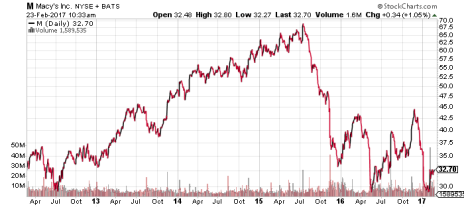Macy’s stock has been in a downward spiral for the past 18 months. And a major credit-rating agency just made things worse.
Standard & Poor’s has downgraded Macy’s (M) credit rating from “BBB” to “BBB-“, putting it just one notch above junk status. “Unrelenting competition from online, fast-fashion and off-price retailers” were the main reasons for the downgrade, according to Standard & Poor’s analyst Helena Song.
Translation: Amid the rise of Amazon.com (AMZN), only high-end fashion stores and deep-discount retailers are still thriving. Department stores like Macy’s are neither high fashion nor deep discount, and are thus falling by the wayside.
[text_ad]
Five years ago, Macy’s was still doing quite well. Sales were growing close to 5% and earnings were regularly expanding by double digits. In fact, the company was growing both its top and bottom lines as recently as 2014. And Macy’s stock was soaring, more than doubling from 33 in July 2012 to an all-time high of 72 in July 2015.
Since then, it’s been all downhill.
In 2015, sales and earnings declined for the first time since the recession as customers began leaving in droves for the convenience of Amazon and other online retailers. The company hasn’t had a positive quarter since.
Macy’s stock has plunged accordingly, plummeting from its 72 peak to 34 by the end of 2015, and hitting bottom below 30 about a month ago.
Today’s credit downgrade surely won’t help matters; when your company is very close to being deemed “junk,” it doesn’t exactly inspire investor confidence.
Things could only get worse for Macy’s stock. Barring some radical innovations or a complete image overhaul, department stores aren’t going to suddenly regain their popularity. This isn’t merely a down cycle for the industry. As Song wrote in her report, it’s “a symptom of secular change in consumer spending habits.” Malls across America are shuttering their doors—the one I used to take my kids to is about to close up shop for good. Thus, department stores like Macy’s are becoming endangered species.
Macy’s isn’t the only department store stock to fall victim. It’s merely the latest. In the last five years, Sears Holdings (SHLD) has lost 85% of its value, J.C. Penney (JCP) is down 82%, Kohl’s (KSS) is down 13%, and Dillard’s (DDS) has fallen 9.5%. J.C. Penney and Sears peaked about a decade ago. Like Macy’s, Kohl’s and Dillard’s topped out in mid-2015 and have been on steep decline ever since.
To me, the entire industry is untouchable for investors. Some may see a value investing opportunity in Macy’s stock now that it’s trading at just 11 times forward earnings, especially since 2017 earnings are expected to grow for the first time in three years. That may be good for a temporary push back to the low 40s (44 has been the resistance point for the past 18 months).
But because of its place in a crumbling industry, I don’t see the long-term viability of the stock or the company.
Neither does Standard & Poor’s. And their opinion really matters.
[author_ad]

